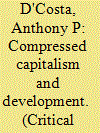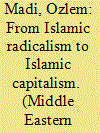|
|
|
Sort Order |
|
|
|
Items / Page
|
|
|
|
|
|
|
| Srl | Item |
| 1 |
ID:
134046


|
|
|
|
|
| Publication |
2014.
|
| Summary/Abstract |
The global capitalist system is at a particular historical juncture with a dilution of the capitalist core away from Western (and Japanese) centers of accumulation to China and India, among other countries. What is the nature of capitalism in these countries? Are China and India going along the same development trajectories that advanced capitalist countries followed earlier? Is their accumulation model the same as that of the OECD economies or is accumulation different under late capitalism? The author argues that capitalism in India and China is "compressed," meaning that the phases of capitalism do not follow one another in sequential order. Instead, some phases, such as primitive accumulation, may be delayed or be experienced at the same time as advanced accumulation under the corporate sector, thereby producing a mode of development that does not generate widespread employment. The author contends that capitalism in India and China is compressed and he demonstrates empirically that primitive accumulation, petty commodity producing sectors, and mature capitalism in late-industrializing countries reinforce each other, creating precarious forms of employment in the process.
|
|
|
|
|
|
|
|
|
|
|
|
|
|
|
|
| 2 |
ID:
128216


|
|
|
|
|
| Publication |
2014.
|
| Summary/Abstract |
The rise of Turkish Islamic capitalism, and with it an Islamic bourgeoisie and the accompanying lifestyle has profound implications for the Muslim world, since the Turkish Muslims have been backed by a relatively successful democratic and liberal system that has allowed them to integrate more easily into the global system. Focusing mainly on the members of the Islamic-oriented Association of Economic Entrepreneurship and Business Ethics (?G?AD), the aim of this article is to demonstrate the inherent (in)compatibility and contradictions between Islam and capitalism in contemporary Turkey, and by extension in the Muslim world. From the start, for the Turkish Muslim bourgeoisie, the burning questions were 'how to earn' and, more importantly, 'how to consume' within a capitalist system while still not transgressing Islamic boundaries. In order to overcome these challenges, the article argues that, rather than creating an 'alternative Islamic economic system', Islamic actors have reduced - in some cases, even eliminated - this discursive and ideological tension between Islam and capitalism by (a) trying to introduce Islamic morality into capitalism and (b) redefining both Islam and capitalism. Through these mechanisms they have also broadened and deepened Turkish modernity.
|
|
|
|
|
|
|
|
|
|
|
|
|
|
|
|
|
|
|
|
|